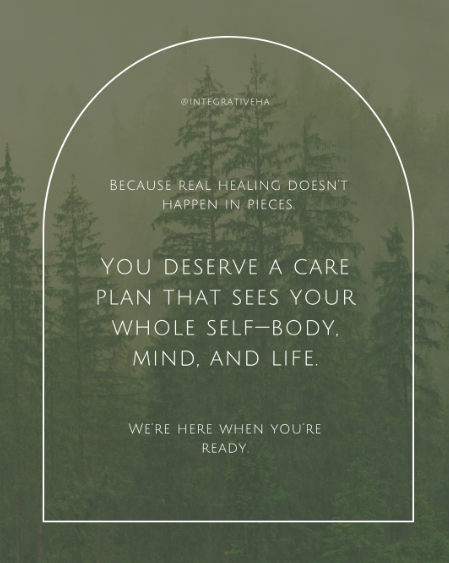Integrative Psychiatry Approaches: A Whole-Person Path to Mental Wellness
Modern psychiatry has given us powerful tools like medications, structured therapies, and clinical evaluations that help millions of people each year. But if you have ever left an appointment with a prescription and still wondered, “Why do I feel off?” you are not alone.
Integrative psychiatry approaches were born out of this gap. Instead of seeing symptoms as isolated problems to suppress, they ask deeper questions: What is your body trying to tell us? How does your lifestyle, sleep, nutrition, or trauma show up in your mental health? This is not about rejecting medications. It is about not being med-only.
At IHA, we practice psychiatry as a whole-person discipline. We use labs, therapy, supplements, lifestyle interventions, and sometimes yoga, meditation, or psychobiotics. We believe your body is a compass, and every symptom is information.
Why Integrative Psychiatry Matters
Psychiatry is unique compared to other areas of medicine. For many mental health conditions, we do not yet know the exact root cause. Depression, anxiety, bipolar disorder, trauma-related symptoms, and others do not always respond fully to traditional psychiatric treatments. That is where integrative psychiatry approaches step in.
Rather than focusing only on reducing depressive or anxious symptoms with medication, integrative psychiatry emphasizes prevention, whole-person healing, and lifestyle shifts that improve both brain and body health.
For patients who feel dismissed or stuck, this model offers something essential: time, curiosity, and a wider set of tools to restore mental clarity and emotional health.
Recent research supports this blended model. In “The Role of Integrative Health in Mental Wellness” (Indiana Wesleyan University, May 2025), Aaron Cawthorn explains that integrative psychiatry combines counseling with complementary therapies like mindfulness, nutrition, movement-based practices, and even acupuncture to promote holistic healing. Studies show that regular exercise can cut depression symptoms by more than 50%, while nutritional interventions such as B vitamins and folic acid help regulate mood. Screening tools like the PHQ-9 and GAD-7 further demonstrate how outcomes can be tracked, proving that whole-person approaches go beyond symptom relief to achieve lasting wellness.
Whole-Person Care: More Than Symptom Management
Traditional psychiatry often zeroes in on diagnoses like depression, generalized anxiety disorder, or PTSD. But your brain does not live in isolation. It is connected to your gut, hormones, sleep cycles, movement patterns, and even how you process past trauma.
Integrative psychiatry views patients as whole systems. Instead of rushing through symptoms, we ask:
How are you sleeping?
What is your nutrition like?
Is your body stuck in fight-or-flight mode as if there is a tiger in the room, even when life is quiet?
How does stress show up in your gut, skin, or energy levels?
This whole-person evaluation allows us to build psychiatric treatments that align with how your body actually feels, not just what your lab results show.
The Role of Lifestyle in Mental Health
A growing body of research shows how movement, diet, and sleep directly affect mental health outcomes. These are not extras; they are core psychiatric treatments when applied thoughtfully.
Movement and Exercise
Exercise is not about chasing fitness goals; it is about re-regulating the brain. Studies show regular movement can cut major depression symptoms by more than half. Even 150 minutes of brisk walking per week can improve mood, reduce anxiety, and protect long-term brain health.
For patients struggling with motivation, we start small with short walks, light stretching, or yoga. The goal is not perfection. It is consistency that signals safety back to your nervous system.
Restorative Sleep
Up to 80 percent of patients with mental health conditions also struggle with sleep. Insomnia, restless nights, or irregular schedules keep the brain in survival mode. Sleep is not just rest; it is when the brain repairs itself, balances mood-regulating chemicals, and consolidates memory.
Cognitive-behavioral therapy for insomnia (CBT-I), combined with practical sleep hygiene steps like avoiding caffeine late in the day, limiting screen time, and keeping the bedroom cool and dark, can restore natural rhythms. Sleep is one of the most underused psychiatric treatments we have.
Food as Medicine and the Gut-Brain Axis
What you eat does not just fuel your body; it shapes your mind. Diets heavy in processed food are linked to higher rates of depression and anxiety, while eating patterns like the Mediterranean diet support mental wellness through anti-inflammatory and neuroprotective effects.
Nutrients That Matter
Omega-3 fatty acids (EPA and DHA): Found in salmon, sardines, and algae oil. They reduce inflammation, support brain function, and may shorten depressive episodes.
Magnesium: Low levels are tied to anxiety and depressive symptoms. Foods like leafy greens, nuts, and whole grains naturally restore it.
Vitamin D: Essential for mood regulation and brain health. Low levels correlate with higher rates of depression, especially in people with limited sun exposure.
The Gut-Brain Axis
The gut microbiome, your internal ecosystem of bacteria and microbes, communicates directly with your brain. Disruptions here can lead to mood instability, anxiety, and even cognitive decline.
This is where psychobiotics, or probiotics used for mental health, and nutrition come in. Fermented foods, fiber-rich diets, and supplements can rebalance the microbiome, improving both digestion and mood. It is psychiatry that starts in the gut.
Mindfulness, Meditation, and Therapy
Mental wellness depends not only on what you eat or how you sleep, but also on how you process emotions in real time.
Mindfulness Practices
Mindfulness teaches you to pause, breathe, and notice your thoughts without judgment. Programs like mindfulness-based stress reduction (MBSR) and mindfulness-based cognitive therapy (MBCT) combine meditation, yoga, and group support. They have been shown to reduce relapse in depressive disorders as effectively as antidepressants.
Talk Therapy and Counseling
Psychotherapy, including cognitive-behavioral therapy (CBT), trauma-informed therapy, and counseling, remains central in integrative psychiatry. When combined with mindfulness, nutrition, and lifestyle changes, talk therapy helps patients connect the dots between body and mind.
Relaxation and Alternative Therapies
Acupuncture, massage, and biofeedback are supportive treatments for anxiety, trauma, and chronic stress. While they do not replace psychiatric treatments, they can reduce symptoms, improve emotional health, and restore a sense of safety in the body.
Supporting Patients with Chronic Conditions
For patients with serious mental health conditions such as bipolar disorder, schizophrenia, dementia, or Alzheimer’s disease, integrative psychiatry approaches provide supportive care that improves quality of life.
For example:
Trauma survivors may benefit from grounding techniques, somatic therapy, and yoga alongside medication.
Patients with dementia may use structured sleep, nutrition, and mindfulness practices to preserve cognitive function and reduce distress.
Those with chronic depression or anxiety often find long-term relief when psychiatric treatments are combined with lifestyle, therapy, and nutritional interventions.
A Smarter Future for Mental Health Care
Integrative psychiatry approaches remind us that mental wellness is not just about suppressing symptoms; it is about restoring balance across mind, body, and lifestyle. By looking at sleep, nutrition, therapy, trauma, and the gut-brain axis alongside medications, patients finally get care that feels complete.
If you have tried medication but still do not feel like yourself, it might be time to explore an integrative path. At IHA, we take the time to connect the dots and build treatment plans that actually match your body’s signals.
Your body is the compass. We are here to help you read it.
Schedule your evaluation with IHA today and take the first step toward mental clarity, emotional health, and lasting healing.
FAQs
1. What makes integrative psychiatry different from traditional psychiatry?
It blends medications and therapy with nutrition, sleep, mindfulness, and lifestyle interventions to treat the whole person, not just the diagnosis.
2. Can integrative psychiatry help with chronic conditions like bipolar disorder or dementia?
Yes. While it does not cure these conditions, it provides supportive strategies that improve quality of life and reduce symptoms.
3. How does the gut-brain axis affect mental health?
The gut microbiome influences mood, cognition, and brain function. Imbalances can worsen depression, anxiety, and cognitive decline.
4. Do I have to stop taking my psychiatric medications to try integrative approaches?
No. Integrative psychiatry is not anti-medication; it simply adds more options beyond meds alone.
5. What role does sleep play in mental health?
Restorative sleep is critical for mood regulation, memory, and emotional stability. Poor sleep worsens depression, anxiety, and other mental health conditions.



